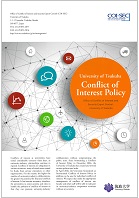Basic rules on COI management
1. Transparency of financial interests
The rule of transparency of financial interests imposes an obligation for faculty and other staff to disclose their individual interests that they received from outside entities such as companies when such interests exceed a preset threshold.
Moreover, we make this information public to the extent that it does not infringe on the privacy of individuals.
Handling it this way makes it possible for the University to ascertain the facts behind the conflicts of interest of faculty and categorize conflicts into those that need to be resolved and those that do not. For those that need to be resolved, it is possible to implement necessary measures by discussing the issue at the COI Committee when needed.
In addition, even when managing institutional conflicts of interest, we make an effort to disclose as much information as possible; and the results of deliberations by the COI Committee and COI Advisory Board, excluding information that should be respected as personal information, are made public in principle.
2. Fairness of decision-making
Fairness of decision-making means that, when the University makes decisions regarding whether to establish a special relationship with entities such as companies and one of faculty members or other staff receives particular personal interests from that company, that member should not be permitted to take part in such decision-making. Because it could undermine the public trust in the University’s fair decisions, if that member were to take part in such decision, regardless of whether damages are actual or not.
3. Responsibility proportionate to administrative authority
Those who are in a position to make decisions at the University or those who serve as a liaison between industry, government and the University have a greater responsibility in terms of conflicts of interest than other staff engaging in routine work.
Therefore, a person in a position of trust might be required to resolve, based on a report of disclosure of his or her personal interests, such a conflict of interest, (e.g., transfer of stocks, resignation as executive of an outside company) that other members of staff would not be obliged to respond to.
4. Managing institutional conflicts of interest
Problems related to the University’s own interests could easily grow serious. Consequently, we are required to respond to such problems based on the above rules (Transparency of financial interests, Fairness of decision-making, Responsibility proportionate to administrative authority).

















